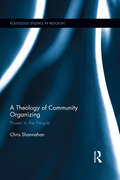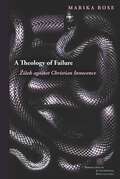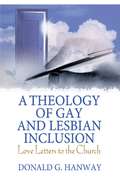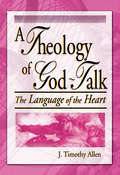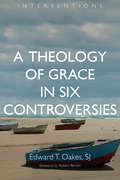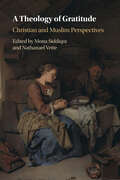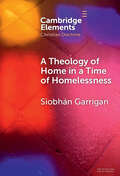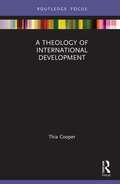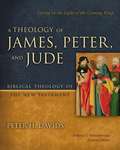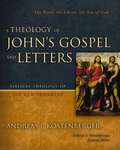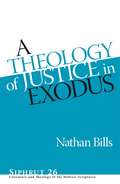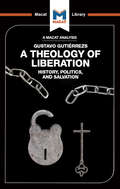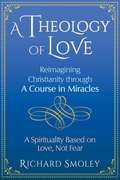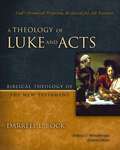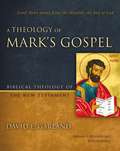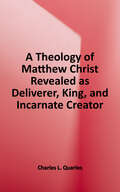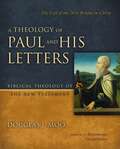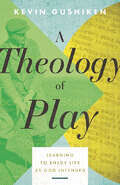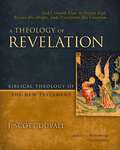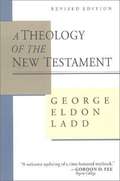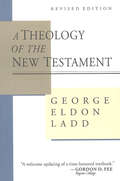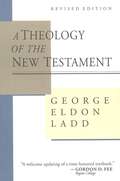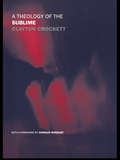- Table View
- List View
A Theology of Community Organizing: Power to the People (Routledge Studies in Religion #35)
by Chris ShannahanThe rising importance of community organizing in the US and more recently in Britain has coincided with the developing significance of social movements and identity politics, debates about citizenship, social capital, civil society, and religion in the public sphere. At a time when participation in formal political process and membership of faith groups have both declined dramatically, community organizing has provided a new opportunity for small community groups, marginalized urban communities, and people of faith to engage in effective political action through the developments of inter-faith and cross-cultural coalitions of groups. In spite of its renewed popularity, little critical attention has been paid to community organizing. This book places community organizing within debates about the role of religion in the public sphere and the rise of public theology in recent years. The book explores the history, methodology, and achievements of community organizing, engaging in a series of conversations with key community organizers in the US and Britain. This volume breaks new ground by beginning to articulate a cross-cultural and inter-faith ‘Theology for Community Organizing’ that arises from fresh readings of Liberation Theology.
A Theology of Failure: Žižek against Christian Innocence (Perspectives in Continental Philosophy)
by Marika RoseEveryone agrees that theology has failed; but the question of how to understand and respond to this failure is complex and contested. Against both the radical orthodox attempt to return to a time before the theology’s failure and the deconstructive theological attempt to open theology up to the hope of a future beyond failure, Rose proposes an account of Christian identity as constituted by, not despite, failure. Understanding failure as central to theology opens up new possibilities for confronting Christianity’s violent and kyriarchal history and abandoning the attempt to discover a pure Christ outside of the grotesque materiality of the church.The Christian mystical tradition begins with Dionysius the Areopagite’s uncomfortable but productive conjunction of Christian theology and Neoplatonism. The tensions generated by this are central to Dionysius’s legacy, visible not only in subsequent theological thought but also in much twentieth century continental philosophy as it seeks to disentangle itself from its Christian ancestry. A Theology of Failure shows how the work of Slavoj Žižek represents an attempt to repeat the original move of Christian mystical theology, bringing together the themes of language, desire, and transcendence not with Neoplatonism but with a materialist account of the world. Tracing these themes through the work of Dionysius and Derrida and through contemporary debates about the gift, violence, and revolution, this book offers a critical theological engagement with Žižek's account of social and political transformation, showing how Žižek's work makes possible a materialist reading of apophatic theology and Christian identity.
A Theology of Gay and Lesbian Inclusion: Love Letters to the Church
by Donald G HanwayEncourage the Church to address the gift of human sexuality-how to view it, how to deal with it, and how it relates to spiritualityA Theology of Gay and Lesbian Inclusion: Love Letters to the Church challenges traditional church teachings that brand homosexuality as immoral, using pertinent scripture from the central Gospel to promote a full acceptance of gay and lesbian Christians. This powerful book questions the assumption that gay Christians are morally inferior, presenting testimony from gay men and lesbians about prejudice they&’ve experienced at the hands of the Church-and its straight members. Written as a series of ten letters, the book addresses the strengths and weaknesses of the church and appeals for a new understanding and commitment to the acceptance of its gay members. From the author:The purpose of this book is to equip you, Christian warrior of the Gospel of peace, to stand against those who use the Bible to resist change-even that change of which our Lord would approve. In one sense, there is nothing revolutionary about this book. It is a book that respects tradition-but only up to a point: that point where tradition has to change, to give way to what the Holy Spirit is showing us in our day of the mind of Christ. And this is not revolutionary, because tradition has had to change before; it is a developing truth, born of the corporate experience of the children of God, and open to our claiming the exercise of our God-given gift of reason. A Theology of Gay and Lesbian Inclusion includes a series of letters that progress from establishing the purpose and credibility of the author, to developing grounding in Scripture and experience, to appealing to the reader to act as an ally of gay and lesbian Christians. The letters include: "Dear Christian Believer," which aims for the "bull&’s-eye" of the reader&’s faith "Dear Sexual Being," which offers a fresh look at a sensitive topic "Dear Confused Church Member," which discusses what gay people are "really" like "Dear Concerned Church Member," which discusses what gay people really want "Dear Bible Explorer," which discusses what the Bible really says "Dear Person Trying to Do the Right Thing," from "being" to "doing" and much moreA Theology of Gay and Lesbian Inclusion provides a friendly and informal Biblical rationale for alternatives to traditional church teachings, encouraging the acceptance of gay and lesbian people as fully moral and fully Christian.
A Theology of God-Talk: The Language of the Heart
by Harold G Koenig J. Timothy AllenUse this common coping mechanism to help people respond to crises!This thoughtful book offers a fresh theological interpretation for the ways people talk about God in times of crisis. A Theology of God-Talk: The Language of the Heart probes the meaning behind phrases like “It must have been God’s will” and “The Lord took Uncle Harry.” Though many caring professionals dismiss such talk as insensitive or irrational, these phrases offer powerful clues to the speaker’s personal religious feelings. A Theology of God-Talk demonstrates the ways that God-talk moves the sufferer through the grief and doubt of the crisis. By recognizing the ways God-talk resembles myth, apocalyptic tale, tragedy, story, and even prayer--all literary categories--the caregiver can begin to help sufferers rewrite their personal narratives in the wake of tragedy. A Theology of God-Talk examines the crucial issues of God-talk, including: common false assumptions about it the theology of God-talk interpretations and misinterpretations how to glean counseling insights from God-talk differing stances for sufferers and survivors of tragedyBringing together psychology, theology, and narrative theory, this insghtful and sensitive book offers new ways of looking at this common reaction to crisis. A Theology of God-Talk is an instant classic and an essential resource for pastors, chaplains, therapists, grief counselors, and theologians.
A Theology of Grace in Six Controversies (Interventions)
by Edward T. OakesFew topics in theology are as complex and multifaceted as grace: over the course of centuries, many seemingly arbitrary distinctions and arcane debates have arisen around it. Edward Oakes, however, argues that all of these distinctions and debates are ultimately motivated by one central question: What are God&’sintentions for the world? In A Theology of Grace in Six Controversies Oakes examines issues relating to grace and points them back to that central question, illuminating and explaining what is really at stake in these debates. Maintaining that controversies clarify issues, especially those as convoluted as that of grace, Oakes works through six central debates on the topic, including sin and justification, evolution and original sin, and free will and predestination.
A Theology of Grace in Six Controversies (Interventions)
by Robert Barron Edward T. Oakes S.J.Few topics in theology are as complex and multifaceted as grace: over the course of centuries, many seemingly arbitrary distinctions and arcane debates have arisen around it. Edward Oakes, however, argues that all of these distinctions and debates are ultimately motivated by one central question: What are God’sintentions for the world? In A Theology of Grace in Six Controversies Oakes examines issues relating to grace and points them back to that central question, illuminating and explaining what is really at stake in these debates. Maintaining that controversies clarify issues, especially those as convoluted as that of grace, Oakes works through six central debates on the topic, including sin and justification, evolution and original sin, and free will and predestination.
A Theology of Gratitude: Christian and Muslim Perspectives
by Mona Siddiqui Nathanael VetteHow, from a theological standpoint, should we make sense of gratitude? This rich interdisciplinary volume is the first concertedly to explore theologies of gratitude from both Christian and Muslim perspectives. While the available literature has tended to rhapsodize gratitude to God and others as both a virtue and an obligation, this book by contrast offers something new by detailing ways in which gratitude is complicated by inequality: even to the point of becoming a vice. Gratitude now emerges as something more than a virtue and other than merely transactional. It can be a burden, bringing about indebtedness and an imbalance of power; but it may also be a resonant source of reconciliation and belonging. Topics discussed cover the personal and political dimensions of gratitude, including such issues as justice, multiculturalism, racism, imperialism, grief, memory and hope. The book assembles, from different traditions, some of the leading theologians of our times.
A Theology of Home in a Time of Homelessness (Elements in Christian Doctrine)
by Siobhán GarriganHomelessness abounds today in various forms of displacement and as a pervasive condition of unbelonging. It ruins health, lives, communities, habitats, creativity, and hope. This Element argues that for theology to play its part in ending homelessness, it must better understand its own concept of 'home'. The Element proposes a vision of home capable of resisting the tacit, mistaken theology of home that undergirds the various iterations of modern homelessness. Weaving biblical and ritual sources, the argument constructs theological responses to the twin forces of consumerism and nationalism which, alloyed with sexism and racism, constitute the time of homelessness in which we live. It asks the reader to imagine home as 'participating instead of possessing' in every sphere of life, in pursuit of a theology of home capable of preventing homelessness and not merely ministering to people experiencing it. This title is also available as Open Access on Cambridge Core.
A Theology of International Development (Routledge Research in Religion and Development)
by Thia CooperReligion and development have been intertwined since development's beginnings, yet faith-based aid and development agencies consistently fail to consider how their theology and practice intersect. This book offers a Christian theology of development, with practical solutions to bridge the gap and return to truly faith-based policies and practices. Development aims to raise the living standard of the world’s poor, mainly through small-scale projects that increase economic growth. A theology of liberation provided a critique to development practice, but a specific theology of development is still lacking, and many faith-based aid agencies have failed to adapt their practice. In applying theological thinking to development, the author argues that aid agencies need to address the entrenchment of unequal power relations, and embrace a holistic notion of development, defined by the needs of those most marginalized, instead of by a focus on economic growth. Development organisations need to consider the distinction between charity and justice, and to empower people in the Global South, paying particular attention to the intersections of race, class, sexuality, religion, and the environment. Overall this book is a powerful call to upend development practice as it currently exists and to return faith-based organizations to following Christian practices. It will be an important read for religion and development researchers, practitioners, and students.
A Theology of James, Peter, and Jude: Living in the Light of the Coming King
by Andreas J. Kostenberger Peter H. DavidsIn this volume, Peter Davids offers a comprehensive study of the General or Catholic Epistles of James, 1-2 Peter, and Jude, which are often insufficiently covered in more general New Testament introductions, theologies, and surveys. Before discussing a theology of each of the four letters, Davids first deals with their common aspects—their shared background in the Greco-Roman world and a similar Christology, view of the source of sin, and eschatology—thus justifying their being treated together. In the chapters that follow, Davids embarks upon a theological reading of each letter informed by its social-rhetorical understanding—what they meant in the context of their original cultural settings—including: a survey of recent scholarship, a discussion of relevant introductory issues, a thematic commentary, a treatment of important theological themes, and a discussion of the place of the letter in the biblical canon and its contribution to New Testament theology. The Biblical Theology of the New Testament (BTNT) series provides upper college and seminary-level textbooks for students of New Testament theology, interpretation, and exegesis. Pastors and discerning theology readers alike will also benefit from this series. Written at the highest level of academic excellence by recognized experts in the field, the BTNT series not only offers a comprehensive exploration of the theology of every book of the New Testament, including introductory issues and major themes, but also shows how each book relates to the broad picture of New Testament theology.
A Theology of John's Gospel and Letters: The Word, the Christ, the Son of God (Biblical Theology of the New Testament Series)
by Andreas J. KostenbergerA Theology of John’s Gospel and Letters introduces the first volume in the BTNT series. Building on many years of research and study in Johannine literature, Andreas Köstenberger not only furnishes an exhaustive theology of John’s Gospel and letters, but also provides a detailed study of major themes and relates them to the Synoptic Gospels and other New Testament books. Readers will gain an in-depth and holistic grasp of Johannine theology in the larger context of the Bible. D. A. Carson (Trinity Evangelical Divinity School) says about Köstenberger’s volume that “for the comprehensiveness of its coverage in the field of Johannine theology (Gospel and Letters), there is nothing to compare to this work.” I. Howard Marshall (University of Aberdeen) writes, “This book is a ‘first’ in many ways: the first volume that sets the pattern for the quality and style of the new Biblical Theology of the New Testament series published by Zondervan; the first major volume to be devoted specifically to the theology of John’s Gospel and Letters at a high academic level; and the first volume to do so on the basis that here we have an interpretation of John’s theology composed by an eyewitness of the life and passion of Jesus.” The Biblical Theology of the New Testament Series The Biblical Theology of the New Testament (BTNT) series provides upper college and seminary-level textbooks for students of New Testament theology, interpretation, and exegesis. Pastors and discerning theology readers alike will also benefit from this series. Written at the highest level of academic excellence by recognized experts in the field, the BTNT series not only offers a comprehensive exploration of the theology of every book of the New Testament, including introductory issues and major themes, but also shows how each book relates to the broad picture of New Testament theology.
A Theology of Justice in Exodus (Siphrut)
by Nathan BillsThis book traces the theme of justice throughout the narrative of Exodus in order to explicate how yhwh’s reclamation of Israel for service-worship reveals a distinct theological ethic of justice grounded in yhwh’s character and Israel’s calling within yhwh’s creational agenda.Adopting a synchronic, text-immanent interpretive strategy that focuses on canonical and inner-biblical connections, Nathan Bills identifies two overlapping motifs that illuminate the theme of justice in Exodus. First, Bills considers the importance of Israel’s creation traditions for grounding Exodus’s theology of justice. Reading Exodus against the backdrop of creation theology and as a continuation of the plot of Genesis, Bills shows that the ethical disposition of justice imprinted on Israel in Exodus is an application of yhwh’s creational agenda of justice. Second, Bills identifies an educational agenda woven throughout the text. The narrative gives heightened attention to the way yhwh catechizes Israel in what it means to be the particular beneficiary and creational emissary of yhwh’s justice. These interpretative lenses of creation theology and pedagogy help to explain why Israel’s salvation and shaping embody a programmatic applicability of yhwh’s justice for the wider world.This volume will be of substantial interest to divinity students and religious professionals interested in the themes of exodus, exile, and return.
A Theology of Justice in Exodus (Siphrut: Literature and Theology of the Hebrew Scriptures #26)
by Nathan BillsThis book traces the theme of justice throughout the narrative of Exodus in order to explicate how yhwh’s reclamation of Israel for service-worship reveals a distinct theological ethic of justice grounded in yhwh’s character and Israel’s calling within yhwh’s creational agenda.Adopting a synchronic, text-immanent interpretive strategy that focuses on canonical and inner-biblical connections, Nathan Bills identifies two overlapping motifs that illuminate the theme of justice in Exodus. First, Bills considers the importance of Israel’s creation traditions for grounding Exodus’s theology of justice. Reading Exodus against the backdrop of creation theology and as a continuation of the plot of Genesis, Bills shows that the ethical disposition of justice imprinted on Israel in Exodus is an application of yhwh’s creational agenda of justice. Second, Bills identifies an educational agenda woven throughout the text. The narrative gives heightened attention to the way yhwh catechizes Israel in what it means to be the particular beneficiary and creational emissary of yhwh’s justice. These interpretative lenses of creation theology and pedagogy help to explain why Israel’s salvation and shaping embody a programmatic applicability of yhwh’s justice for the wider world.This volume will be of substantial interest to divinity students and religious professionals interested in the themes of exodus, exile, and return.
A Theology of Liberation
by Jonathan Teubner Marthe HesselmansPeruvian priest Gustavo Gutiérrez wanted to solve the problem of how the church could conduct itself to improve the lives of the poor, while consistently positioning itself as politically neutral. Despite being a deeply religious man, Gutiérrez was extremely troubled by the lukewarm way in which Christians in general, and the Catholic Church in particular, acknowledged and supported the poor. In A Theology of Liberation, he asked what he knew was an awkward question, and came to an awkward answer: the Church cannot separate itself from economic and political realities. Jesus showed his love for the poor in practical ways – healing the sick, feeding the hungry, liberating the oppressed. His example showed Gutierrez that economic, political, social and spiritual development are all deeply connected. His problem-solving prowess then led him to conclude that the church had to become politically active if it was to confront poverty and oppression across the world. For Gutierrez, the lives of the poor and oppressed directly reflect the divine life of God.
A Theology of Love: Reimagining Christianity through A Course in Miracles
by Richard SmoleyA spirituality based on love, not fear • Shares key, inspiring teachings from A Course in Miracles as well as Hinduism, Buddhism, Gnosticism, and the Sefer Yetzirah, the oldest known Kabbalistic text • Cites philosophical wisdom from Kant, Blake, Jung, and Gurdjieff, alongside cognitive science, to reveal how the world is not difficult and flawed, but our fear-based mind-sets lead us to see it that way • Offers a path to help you regenerate from the &“fallen&” state and experience God as infinite love and light In the West, theology has almost always meant Christian theology--a hodgepodge of beliefs that are hard to make sense of. Why, for example, should an all-loving, merciful God have gotten mad at the human race because someone ate a piece of fruit six thousand years ago? And why would he send part of himself down to earth to be tortured to death? These beliefs, stated baldly, are nonsensical. Millions of people are realizing this and losing their faith. The time has come to reenvision Christian theology without contradictory teachings laced with fear. It is time for a theology of love and miracles. Richard Smoley reframes Christian theology using logical, consistent, and easy-to-understand teachings of unconditional love and forgiveness. He draws inspiration not only from the Bible, but also from Hinduism, Buddhism, Gnosticism, and from esoteric and mystical teachings, such as A Course in Miracles and the Sefer Yetzirah, the oldest known Kabbalistic text. He explains how the &“fallen&” state of the human condition, not one of sin but of oblivion, leads us to experience the world as flawed and problematic--not wholly evil, but not wholly good. Citing philosophical wisdom from Kant, Blake, Jung, and Gurdjieff, alongside cognitive science, Smoley reveals how it is not the world that is flawed, but the way we see the world. Sharing key teachings from A Course in Miracles, he shows that our fear-based mind-sets--often filled with anxiety, suffering, and shame--lead us to feel separated from God when, in fact, we are all extensions of a God of infinite love and light. Offering a path to help you regenerate from the &“fallen&” state and see the real spiritual world and loving God that lies behind it, the author provides ways for each of us to craft our own self-consistent theology. He also lays out a vision for the future of spirituality, a path for present-day religion to transform into something higher and more universal.
A Theology of Luke and Acts: God’s Promised Program, Realized for All Nations (Biblical Theology of the New Testament Series)
by Darrell L. Bock Andreas J. KostenbergerThis groundbreaking work by Darrell Bock thoroughly explores the theology of Luke’s gospel and the book of Acts. In his writing, Luke records the story of God working through Jesus to usher in a new era of promise and Spirit-enablement so that the people of God can be God’s people even in the midst of a hostile world. It is a message the church still needs today. Bock both covers major Lukan themes and sets forth the distinctive contribution of Luke-Acts to the New Testament and the canon of Scripture, providing readers with an in-depth and holistic grasp of Lukan theology in the larger context of the Bible. I. Howard Marshall: “A remarkable achievement that should become the first port of call for students in this central area of New Testament Theology.” Craig S. Keener: “Bock’s excellent exploration of Luke’s theological approach and themes meets an important need in Lukan theology.”
A Theology of Mark's Gospel: Good News about Jesus the Messiah, the Son of God
by David E. Garland Andreas J. KostenbergerA Theology of Mark’s Gospel is the fourth volume in the BTNT series. This landmark textbook, written by leading New Testament scholar David E. Garland, thoroughly explores the theology of Mark’s Gospel. It both covers major Markan themes and also sets forth the distinctive contribution of Mark to the New Testament and the canon of Scripture, providing readers with an in-depth and holistic grasp of Markan theology in the larger context of the Bible. This substantive, evangelical treatment of Markan theology makes an ideal college- or seminary-level text.
A Theology of Matthew: Jesus Revealed as Deliverer, King, and Incarnate Creator (Explorations in Biblical Theology Ser.)
by Charles L. QuarlesWho is Jesus? Why should we worship him? This book answers those questions by surveying Matthew's primary theological themes and how they interconnect with the rest of the Bible. Quarles focuses on Matthew's portrait of Jesus as the Savior of sinners, the King of God's people, the founder of a new Israel, and the incarnation of the Creator.
A Theology of Paul and His Letters: The Gift of the New Realm in Christ (Biblical Theology of the New Testament Series)
by Douglas J. MooA landmark study of the apostle's writings by one of the world's leading Pauline scholarsWinner of the 2022 ECPA Christian Book Award for Bible Reference WorksThis highly anticipated volume gives pastors, scholars, and all serious students of the New Testament exactly what they need for in-depth study and engagement with one of Christian history's most formative thinkers and writers. A Theology of Paul and His Letters is a landmark study of the apostle's writings by one of the world's leading Pauline scholars Douglas J. Moo. Fifteen years in the making, this groundbreaking work is organized into three major sections:Part 1 provides an overview of the issues involved in doing biblical theology in general and a Pauline theology in particular. Here Moo also sets out the methodological issues, formative influences, and conceptual categories of Paul's thought.Part 2 moves on to Paul's New Testament writings, where Moo describes each Pauline letter with particular relevance to its theology.Part 3 offers a masterful synthesis of Paul&’s theology under the overarching theme of the gift of the new realm in Christ.Engaging, insightful, and wise, this substantive, evangelical treatment of Paul's theology offers extensive engagement with the latest Pauline scholarship without sacrificing its readability. This volume brings insights from over thirty years of experience studying, teaching, and writing about Paul into one comprehensive guide that will serve readers as a go-to resource for decades to come.ABOUT THE SERIES: The Biblical Theology of the New Testament (BTNT) series provides upper college and seminary-level textbooks for students of New Testament theology, interpretation, and exegesis. Pastors and discerning theology readers alike will also benefit from this series. Written at the highest level of academic excellence by recognized experts in the field, the BTNT series not only offers a comprehensive exploration of the theology of every book of the New Testament, including introductory issues and major themes, but also shows how each book relates to the broad picture of New Testament Theology.
A Theology of Play: Learning to Enjoy Life as God Intended
by Kevin M. GushikenGod encourages you to experience great joy in following Jesus God has given humans freedom and permission to play--to fully enjoy life's moments as he intended, with no ulterior motive. The Christian life without play becomes malformed, and believers can miss aspects of the abundant life Jesus came to give. In A Theology of Play, Kevin Gushiken builds a case for getting serious about play as a vital element of being a Christian. "Play," he writes, "is not merely an activity but a way of living." Gushiken explores play from various biblical and theological lenses: How an identity grounded in God's good creation invites us to play The connection between play and the biblical concept of Sabbath Why past hurts don't have to keep us from enjoying the present Releasing false guilt and shame to find true freedom to Play How to play in the midst of difficulty and pain Ultimately, knowing and enjoying God brings freedom and pleasure. A Theology of Play helps Christian believers identify barriers to play in their day-to-day lives and offers faithful guidance in recapturing play within the rhythms of life.
A Theology of Revelation: God's Grand Plan to Defeat Evil, Rescue His People, and Transform His Creation (Biblical Theology of the New Testament Series)
by J. Scott DuvallA Theology of Revelation by J. Scott Duvall in Zondervan's Biblical Theology of the New Testament series provides a comprehensive look at the theology of John's Apocalypse. One of only a few dedicated theologies of Revelation, Duvall's book leaves no stone unturned in the study of the final book of the Christian canon of Scripture. This thoroughly researched study includes:an investigation into the historical framework of the book: authorship, date, and occasion and purpose;a survey of literary-theological foundations: genre, text and canonicity, grammar and symbolic language, use of the Old Testament, literary structure, and interpretation; anda full literary-theological reading of the book, culminating in an exploration of the book's most significant theological themes: God, Jesus Christ, the Holy Spirit, the people of God, worship, discipleship, salvation, God's judgment of evil, and the new creation.Readers will find here a study that is clearly written, attentive to the historical-literary context, with special attention given to the primary theological themes in the book. Perhaps above all, readers will have their hope in God and his amazing plan reinforced and strengthened.
A Theology of the New Testament
by George Eldon Ladd Donald A. HagnerLadd's magisterial work on New Testament theology has well served thousands of seminary students since its publication in 1974. Enhanced and updated here by Donald A Hagner, this comprehensive, standard evangelical text now features augmented bibliographies and two completely new chapters on subjects that Ladd himself wanted to treat in a revised edition--the theology of each of the Synoptic Evangelists and the issue of unity and diversity in the New Testament.
A Theology of the New Testament
by George Eldon LaddLadd's magisterial work on New Testament theology has well served thousands of seminary students since its publication in 1974. Enhanced and updated here by Donald A Hagner, this comprehensive, standard evangelical text now features augmented bibliographies and two completely new chapters on subjects that Ladd himself wanted to treat in a revised edition—the theology of each of the Synoptic Evangelists and the issue of unity and diversity in the New Testament—written, respectively, by R. T. France and David Wenham.
A Theology of the New Testament
by George Eldon LaddLadd's magisterial work on New Testament theology has well served thousands of seminary students since its publication in 1974. Enhanced and updated here by Donald A Hagner, this comprehensive, standard evangelical text now features augmented bibliographies and two completely new chapters on subjects that Ladd himself wanted to treat in a revised edition—the theology of each of the Synoptic Evangelists and the issue of unity and diversity in the New Testament—written, respectively, by R. T. France and David Wenham.
A Theology of the Sublime
by Clayton CrockettA Theology of the Sublime is the first major response to the influential and controversial Radical Orthodoxy movement.Clayton Crockett develops a constructive radical theology from the philosophy of Immanuel Kant - a philosophy attacked by Radical Orthodoxy - to show Kant's relevance to postmodern philosophy and contemporary theology.
